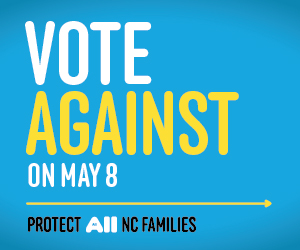
Next month, voters in the state of North Carolina will decide on a constitutional amendment, dubbed Amendment One, that will either allow same-sex marriages in the state or define marriage as between a man and woman. As the amendment gains foothold in the state, its tangled legal language has sparked debate on its legal loopholes for North Carolina residents both gay and straight.
Legal troubles include the forfeit of domestic right benefits for straight couples, who would lose any benefits if the measure should pass. As The Huffington Post asserts, these couples have the option to marry in order to restore benefits – gay couples would not have the same rights if the measure passed.
Amendment One, if passed, may also affect unmarried victims of domestic violence depending on how the legal system interprets its language since its legalese prohibits the validation of “domestic legal unions.”
“The problem is, we don’t know what this language means or how courts would interpret this,” said Maxine Eichner, a professor at the University of North Carolina School of Law. “If courts were going to interpret the constitutional amendment as invalidating any rights or protections for unmarried couples, it would invalidate domestic violence protections.”
Proponents of the initiative argue that it is simple in nature and should not be misinterpreted. “The amendment will allow the people of North Carolina to decide what marriage is defined as,” said state Senator Daniel Soucek, a Republican sponsor of the bill.
“It’s not just the term ‘marriage,'” he told The Huffington Post. “It’s all of the societal communal building blocks that make up traditional marriage. We think that’s the healthiest way to raise children.”
Many corporations including Bank of America, whose corporate headquarters are in Charlotte, have protested the discriminatory amendment, adding that it would be a detriment to the organization’s ability to recruit talent and a step backward in its evolution toward advancement.
“What Amendment 1 does is make it look like we’re a state that ignores both the needs and the preferences of the next generation of America and the world’s workforce,” said Cathy Bessant, Global Technology & Operations Executive at Bank of America.
Richard Vinroot, an influential Republican in Charlotte, said that the definition – or lack thereof — of the amendment bothered him. “I don’t think we should be amending our constitution for something so temporary and in this case so redundant,” he said.
A recent survey in the state showed that a majority of North Carolinians – 58 percent — do not understand Amendment One, although, in general terms, they supported the initiative. 38 percent of voters in North Carolina did not support the anti-gay legislation. According to The Huffington Post, less than one-third of voters correctly identified that Amendment One bans both same-sex marriage and civil unions.
North Carolina voters will head to the ballot to vote on Amendment On on May 8.












“It is important to recognize that only gay people will have gay marriage and that it will not hurt that or any other community. Just like in any married couple, each gay married person is happy to be with the love of his or her life. Happiness is what every person strives for and unless their pursuit of happiness hurts someone else, other people should not interfere. Gay people are not trying to force straight people into same-sex marriages, take away benefits that married straight couples get from the State, or hurt the straight community in any other way. Gay couples are fighting for the right to a legally recognized marriage for their own personal lives they want to share with each other.
When members of the anti-gay community try to stop them, some gay people have described it as “a gut-punch” because it is attacking their attempts at being happy and having equal rights. This gut-punch from the gay bashing is so emotionally, and often physically, painful that many gay people commit suicide to the horrors of those who loved and cared about them. The gay bashing will get worse and more frequent with the hate, which would be manifested in the discriminatory Amendment 1 if it gets passed. This would send a broader message to North Carolina youth because putting established inequality in the State Constitution would tell them that inequality is acceptable. This would lead to increased bullying on all levels towards many more people, not just gay people.”
http://jonforjustice.wordpress.com/2012/04/06/amendment-1-how-it-will-affect-straight-couples-and-gay-couples-alike/